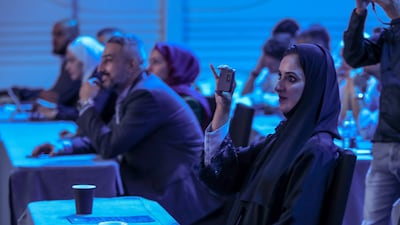Abu Dhabi and Dubai are “well positioned” to be at the forefront of becoming full-fledged smart cities, with several initiatives, particularly those involving 6G technologies, being tabled to help the transition to a futuristic digital economy, a top researcher at the Technology Innovation Institute said.
Both emirates have launched several programmes to advance research and development into the upcoming sixth generation of wireless networks, which is attracting top players globally, said Thierry Lestable, executive director of the AI and Digital Science Research Centre at Abu Dhabi's TII.
The two cities are a “perfect playground in terms of the infrastructure being built … and they have innovative ecosystems of people and industries who share the same vision and are deploying these technologies for the benefit of society”, he told The National in an interview at the inaugural Abu Dhabi 6G Summit.
A smart city utilises the latest information and communications technologies to seamlessly connect people and devices, improve operational efficiency and boost economic activity overall.
Abu Dhabi already leads the Middle East in the global smart city index, ranking 28th, a 2021 report from the Institute for Management Development and the Singapore University for Technology and Design showed. Dubai is right behind in 29th. Both emirates jumped 14 places from their 2020 positions.
Both emirates, and the UAE in general, are promoting the use of smart technologies to accelerate their agenda of becoming knowledge-based economies in the era of digital transformation.
Abu Dhabi is already conducting field trials, testing and deploying vehicles that are connected to smart infrastructure, Mr Lestable said.
It is also moving ahead with trial programmes for drone deliveries, and this month, it is expected that autonomous taxi minibuses will be used for the first time at the Etihad Airways Abu Dhabi Grand Prix.
Dubai, on the other hand, has a smart traffic management system that cuts congestion and emergency response times. It is also planning to put about 4,000 driverless taxis on its roads by 2030.
The UAE also ranked first in the Middle East in the 2021 edition of the Global Innovation Index, cementing its status among the world’s leading countries in adopting the latest technology.
Meanwhile, total foreign direct investment in the UAE, the Arab world's second-largest economy, hit $20.7 billion in 2021, more than doubling over the past decade, the Ministry of Economy recently announced.
Dubai remained the world's top destination for foreign direct investment in the first half of 2022, attracting inflows of $3.74bn on 492 projects, Dubai’s Department of Economy and Tourism said in a report this week, underscoring its efforts to position itself as a hub for advanced technology.
Mr Lestable could not provide an estimate for how many investments are needed to develop 6G technologies but acknowledged “it is a lot of money, for sure”.
For context, the European Commission created the Smart Networks and Services Joint Undertaking programme in November last year, which is mandated to accelerate digital transition and 6G research with a European Union-backed budget of €900 million ($879.6m) through 2027.
The most important return on investment (RoI) smart cities can provide is their ability to reduce harmful emissions, in line with global climate change commitments, and the well-being they will provide to those residing in them.
“The ratio of benefit for business use cases relying on mobile networks compared with other industries is 20 to 1. In terms of RoI, for the fight against change, they would be able to fight 20 times more,” Mr Lestable said.
How can 6G accelerate the development of smart cities?
6G promises even faster speeds and more efficiency compared with the latest 5G technology. It is expected to enhance the capability of today's 5G networks by 100 times. Latency, the delay between sending and receiving information, will be reduced by a factor of 10 to 0.1 millisecond while the energy efficiency of networks will drop by a factor of 100.
Use cases and industries that are already benefiting from 5G stand to benefit significantly more from 6G, Mr Lestable said.
In communications, 6G will be able to provide ubiquitous connectivity, which allows any or all devices to interact seamlessly.
“6G will get all of that converged, and it will find its way to push the boundaries in terms of data rates and speeds of communications,” Mr Lestable said.
Abu Dhabi and Dubai have innovative ecosystems of people and industries who share the same vision and are deploying these technologies for the benefit of society
Thierry Lestable,
executive director of the AI and Digital Science Research Centre
Robots are expected to be used for several purposes, such as in hotels and offices, and the networks, which will help ensure safety and reliability.
“The form factors of robots will be different as they need to be acceptable to ensure their integration with intended purposes will work smoothly, and be optimal in terms of features and functions,” Mr Lestable said.
The healthcare industry would see more remote interactions between medical practitioners and patients. This is already being practised at present, but highly advanced procedures such as remote surgery will become more widespread, as it will capitalise on 6G speeds.
In agriculture, farms connected to 6G networks would be able to utilise drones to water crops and apply fertilisers. Smart farming is already happening, but 6G will allow for faster and more accurate data gathering, Mr Lestable said.
“All of these mean you will get economic growth with smart cities,” he said.
Killing of Qassem Suleimani
The specs
Engine: 4.0-litre flat-six
Torque: 450Nm at 6,100rpm
Transmission: 7-speed PDK auto or 6-speed manual
Fuel economy, combined: 13.8L/100km
On sale: Available to order now
2024%20Dubai%20Marathon%20Results
%3Cp%3E%3Cstrong%3EWomen%E2%80%99s%20race%3A%3C%2Fstrong%3E%0D%3Cbr%3E1.%20Tigist%20Ketema%20(ETH)%202hrs%2016min%207sec%0D%3Cbr%3E2.%20Ruti%20Aga%20(ETH)%202%3A18%3A09%0D%3Cbr%3E3.%20Dera%20Dida%20(ETH)%202%3A19%3A29%0D%3Cbr%3EMen's%20race%3A%0D%3Cbr%3E1.%20Addisu%20Gobena%20(ETH)%202%3A05%3A01%0D%3Cbr%3E2.%20Lemi%20Dumicha%20(ETH)%202%3A05%3A20%0D%3Cbr%3E3.%20DejeneMegersa%20(ETH)%202%3A05%3A42%3C%2Fp%3E%0A
Breast cancer in men: the facts
1) Breast cancer is men is rare but can develop rapidly. It usually occurs in those over the ages of 60, but can occasionally affect younger men.
2) Symptoms can include a lump, discharge, swollen glands or a rash.
3) People with a history of cancer in the family can be more susceptible.
4) Treatments include surgery and chemotherapy but early diagnosis is the key.
5) Anyone concerned is urged to contact their doctor
PROFILE BOX
Company name: Overwrite.ai
Founder: Ayman Alashkar
Started: Established in 2020
Based: Dubai International Financial Centre, Dubai
Sector: PropTech
Initial investment: Self-funded by founder
Funding stage: Seed funding, in talks with angel investors
Benefits of first-time home buyers' scheme
- Priority access to new homes from participating developers
- Discounts on sales price of off-plan units
- Flexible payment plans from developers
- Mortgages with better interest rates, faster approval times and reduced fees
- DLD registration fee can be paid through banks or credit cards at zero interest rates
Day 4, Dubai Test: At a glance
Moment of the day Lahiru Gamage appeared to have been hard done by when he had his dismissal of Sami Aslam chalked off for a no-ball. Replays suggested he had not overstepped. No matter. Two balls later, the exact same combination – Gamage the bowler and Kusal Mendis at second slip – combined again to send Aslam back.
Stat of the day Haris Sohail took three wickets for one run in the only over he bowled, to end the Sri Lanka second innings in a hurry. That was as many as he had managed in total in his 10-year, 58-match first-class career to date. It was also the first time a bowler had taken three wickets having bowled just one over in an innings in Tests.
The verdict Just 119 more and with five wickets remaining seems like a perfectly attainable target for Pakistan. Factor in the fact the pitch is worn, is turning prodigiously, and that Sri Lanka’s seam bowlers have also been finding the strip to their liking, it is apparent the task is still a tough one. Still, though, thanks to Asad Shafiq and Sarfraz Ahmed, it is possible.
Family reunited
Nazanin Zaghari-Ratcliffe was born and raised in Tehran and studied English literature before working as a translator in the relief effort for the Japanese International Co-operation Agency in 2003.
She moved to the International Federation of Red Cross and Red Crescent Societies before moving to the World Health Organisation as a communications officer.
She came to the UK in 2007 after securing a scholarship at London Metropolitan University to study a master's in communication management and met her future husband through mutual friends a month later.
The couple were married in August 2009 in Winchester and their daughter was born in June 2014.
She was held in her native country a year later.
Dr Afridi's warning signs of digital addiction
Spending an excessive amount of time on the phone.
Neglecting personal, social, or academic responsibilities.
Losing interest in other activities or hobbies that were once enjoyed.
Having withdrawal symptoms like feeling anxious, restless, or upset when the technology is not available.
Experiencing sleep disturbances or changes in sleep patterns.
What are the guidelines?
Under 18 months: Avoid screen time altogether, except for video chatting with family.
Aged 18-24 months: If screens are introduced, it should be high-quality content watched with a caregiver to help the child understand what they are seeing.
Aged 2-5 years: Limit to one-hour per day of high-quality programming, with co-viewing whenever possible.
Aged 6-12 years: Set consistent limits on screen time to ensure it does not interfere with sleep, physical activity, or social interactions.
Teenagers: Encourage a balanced approach – screens should not replace sleep, exercise, or face-to-face socialisation.
Source: American Paediatric Association
Gender pay parity on track in the UAE
The UAE has a good record on gender pay parity, according to Mercer's Total Remuneration Study.
"In some of the lower levels of jobs women tend to be paid more than men, primarily because men are employed in blue collar jobs and women tend to be employed in white collar jobs which pay better," said Ted Raffoul, career products leader, Mena at Mercer. "I am yet to see a company in the UAE – particularly when you are looking at a blue chip multinationals or some of the bigger local companies – that actively discriminates when it comes to gender on pay."
Mr Raffoul said most gender issues are actually due to the cultural class, as the population is dominated by Asian and Arab cultures where men are generally expected to work and earn whereas women are meant to start a family.
"For that reason, we see a different gender gap. There are less women in senior roles because women tend to focus less on this but that’s not due to any companies having a policy penalising women for any reasons – it’s a cultural thing," he said.
As a result, Mr Raffoul said many companies in the UAE are coming up with benefit package programmes to help working mothers and the career development of women in general.
QUALIFYING RESULTS
1. Max Verstappen, Netherlands, Red Bull Racing Honda, 1 minute, 35.246 seconds.
2. Valtteri Bottas, Finland, Mercedes, 1:35.271.
3. Lewis Hamilton, Great Britain, Mercedes, 1:35.332.
4. Lando Norris, Great Britain, McLaren Renault, 1:35.497.
5. Alexander Albon, Thailand, Red Bull Racing Honda, 1:35.571.
6. Carlos Sainz Jr, Spain, McLaren Renault, 1:35.815.
7. Daniil Kvyat, Russia, Scuderia Toro Rosso Honda, 1:35.963.
8. Lance Stroll, Canada, Racing Point BWT Mercedes, 1:36.046.
9. Charles Leclerc, Monaco, Ferrari, 1:36.065.
10. Pierre Gasly, France, Scuderia Toro Rosso Honda, 1:36.242.
Eliminated after second session
11. Esteban Ocon, France, Renault, 1:36.359.
12. Daniel Ricciardo, Australia, Renault, 1:36.406.
13. Sebastian Vettel, Germany, Ferrari, 1:36.631.
14. Antonio Giovinazzi, Italy, Alfa Romeo Racing Ferrari, 1:38.248.
Eliminated after first session
15. Antonio Giovinazzi, Italy, Alfa Romeo Racing Ferrari, 1:37.075.
16. Kimi Raikkonen, Finland, Alfa Romeo Racing Ferrari, 1:37.555.
17. Kevin Magnussen, Denmark, Haas Ferrari, 1:37.863.
18. George Russell, Great Britain, Williams Mercedes, 1:38.045.
19. Pietro Fittipaldi, Brazil, Haas Ferrari, 1:38.173.
20. Nicholas Latifi, Canada, Williams Mercedes, 1:38.443.



